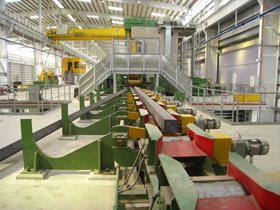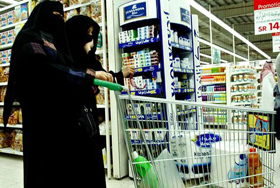Contrary to the established view in Russia, business in the UAE is not limited to oil, tourism and real estate. The United Arab Emirates is justly believed to be an attractive business centre for Russian companies.
Why is the UAE attractive?
When the United Arab Emirates got its independence from the United Kingdom in 1971, the backbone of its economy was oil production and export. Relying on its oil revenues, UAE authorities prepared the ground for the diversification of the economy.
The UAE today is one of the fast-growing economies in the world. While the country is ranked 115th by the size of its territory and population, the 2012 estimates suggest that it is ranked 50th by its real GDP. Although its oil sector accounts for 25 per cent of its GDP, trade, construction, tourism and agriculture are gaining more prominence.
There are several reasons why the UAE, as one of the international economic centres, is attractive for foreign businessmen, including those from Russia:
- an advantageous geographical location, with good infrastructure and communications;
- the UAE authorities have firm control over the social and economic situation in the country, thus mitigating business risks and allowing companies to focus on mid-term strategies for the local market;
- the partnership between the Emirates sea ports and local logistic companies and the leading world transportation hubs helps plan fast deliveries to virtually any part of the globe;
- free economic zones allow businessmen to manage their funds without any restrictions
- it is possible to establish offshore companies.
In the IFC and World Bank’s “Doing Business” report of 2012, the UAE was 26th in the overall ranking, out of 185 economies. The country is among the leaders in such categories as “Paying Taxes” (1st), “Trading across Borders” (5th), “Registering Property” (12th) and “Starting a Business” (22nd). That foreign businessmen can submit their documents for registration in the free economic zones in English is an added benefit.
The perception of the business climate in the country is marred by the requirement under local law to have a UAE citizen among company’s founders, and his share must be at least 51 per cent. This is largely why the Arab Emirates is ranked 128th in the “Protecting Investors” category.
Conditions for Doing Business
The UAE was transformed into a leading trade centre in the Arab world thanks in part to its trade infrastructure, and the simplified permission and cargo clearance procedures for goods to be sold in the country or to be re-exported. The country belongs to the customs zone of the Persian Gulf Arab monarchies, and goods cleared in the country may be sold free of duties elsewhere in the Gulf region.
The UAE charges no more than 5 per cent import duty on most goods; however, the duty on alcohol and tobacco is 50 per cent and 100 per cent respectively. Goods brought into the UAE free economic zones for re-export bear no customs duties.
Foreign businessmen are, however, discomfited by a provision in local law whereby only companies registered in the UAE and properly licensed there can import goods.
There are two ways that foreign businesses may import goods to the UAE to be sold locally:
- they can register the business as a limited liability company at least 51 per cent owned by a local citizen; or
- they can rely on local trade agents.
If a company has been registered in the free economic zone, and it is 100 per cent foreign-owned, it will be barred from commercial activity in the UAE.
The UAE offers tax breaks for individuals as well as corporations. Some companies pay virtually no corporate or social taxes, the exception being foreign oil companies and bank branches, which pay corporate income tax at a rate of 50–55 per cent and about 20 per cent, respectively.
Tax breaks help to promote the construction of production facilities with foreign capital, including that from Russia. For example, Metalloinvest Holding built its Hamriyah Steel rebar operations there.
Russian Business in the UAE: success stories and possibilities
Trade and economic relations between Russia and the UAE have been gradually developing. While in 2011 trade between the two countries was no more than USD 1.5 bn., 2012 estimates suggest it may have increased to about USD 2 bn.
Russian exports to the UAE are dominated by commodities such as precious metals and stones, steel and ferrous metal products, machinery, equipment, vehicles, chemicals, food, wood, paper and cardboard.
The UAE market shows good potential for Russian business due to its large capacity and a wide range of possibilities. The most promising areas for cooperation are energy, the electric power industry, atomic energy and alternative energy, metals, civil aviation, construction, transport, space exploration and agriculture.
The UAE is an attractive market for Russian state-owned and private companies, such as Stroitransgaz, Rosneft, LUKOIL Overseas Holding Ltd., Russian Railways, Magnitogorsk Metallurgical Factory, Hydromashservice, Technopromexport, KAMAZ, and Russian Helicopters. Russian small and medium enterprises, too, contribute to trade and economic cooperation with the UAE.
Russian small and medium companies have had some success in the Emirates market. Stroitransgaz built the Tavila-Fujera gas pipeline; Techsnabexport signed a long-term contract in 2012 with the UAE Atomic Energy Corporation to supply enriched uranium for the first UAE atomic station, Barakah. These and other success stories make us hopeful about the prospects for Russian-Emirate business cooperation.
Additionally, as well as being a market for Russian investment, the UAE may become a source of capital or even technologies for Russian businesses, for instance, in construction or alternative energy.
Business can rely on incentives offered by the improved contractual and legislative framework for trade and economic cooperation, promoted, in particular, by the 2010-2011 Agreement on Facilitation and Mutual Protection of Capital Investment and the Agreement on Capital Gains Tax between the negotiating countries and their financial and investment agencies, or benefit from the establishment of the Russian Export Credit and Investment Agency.
Untapped UAE Potential for Russian Business
Apart from the opportunities for Russia-Emirates collaboration in business, there are other promising areas as yet untried by Russian businessmen, which include, first and foremost, food and chemicals, as well as IT.
Since the UAE imports its food, the country may want some other Russian agricultural goods apart from grain, such as Halal meat, confectionery, soft drinks, cereals, snacks, infant food, and tinned foods.
Manufacturers of chemical agents for the oil industry or mineral and organic fertilisers have good prospects for expanding their presence in the UAE. Russian software and telecom equipment may prove fairly competitive.
There are certain obstacles that hinder Russia-UAE trade and economic cooperation, among which is the lack of information about the economic potential of Russia and the UAE and proposed amendments to laws in both countries; non-compliance of some Russian industrial goods with the requirements of UAE customers; lack of initiative on the part of the Emirates business community looking for partners among Russian businessmen; and the high interests rates that Russian banks charge Russian businesses.
In addition, Russian businessmen fail to use opportunities, partly due to their lack of knowledge and partly due to their lack of will to compete for new markets and accept the existing rate of return.
In summary, Russia may benefit significantly from broader business relations with the UAE, and by getting a foothold in the United Arab Emirates, Russian businesses may help promote this country across the entire Gulf region. Furthermore, everything is already in place to help Russia-UAE business cooperation grow.







